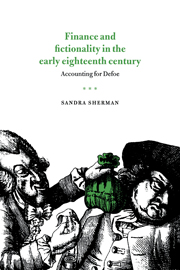Introduction
Published online by Cambridge University Press: 12 January 2010
Summary
This is not a study of The Rise of the Novel, although Defoe's fiction plays a crucial part in my analysis. During the early part of the century, “fiction” was not a formalistic concept, but a broad epistemological crux fusing all sorts of writing – “literary” and nonliterary – into a forbidding phenomenon that disabled apprehension of the real. In recent years, critics have assimilated into the novel's “rise” texts with little or no literary pretension, whose relation to “truth” was unstable. I am concerned with conditions affecting the culture's acceptance of fiction in any genre, “news,” “novel,” “romance,” financial credit. Indeed, Finance and Fictionality is about a retrograde resistance to fiction even less accommodating than the grudging acceptance of “moral fables” by Protestant critics. In this sense, my study finally connects with Rise of the Novel criticism in that it adds a substrate of irony: just when Robinson Crusoe arguably leaves the first footprint in the sands of an emergent genre, the culture – even Defoe – is withdrawing from an overdose of fiction. My thesis explains why therefore, apart from moralistic strictures, a literary fiction (such as Crusoe) does not acknowledge its fictionality.
The central feature of my argument, which accounts for its title, is that the marked instability of Defoe's truth claims did not result from a dogged attempt to reconcile fictive intent with “naive empiricism” (an ur-novelist's incapacity to sever cosmos and heterocosm); it recapitulated the logic of market-generated texts whose unstable truth claims baffled resistance to their own potential fictionality.
- Type
- Chapter
- Information
- Finance and Fictionality in the Early Eighteenth CenturyAccounting for Defoe, pp. 1 - 13Publisher: Cambridge University PressPrint publication year: 1996
- 2
- Cited by



